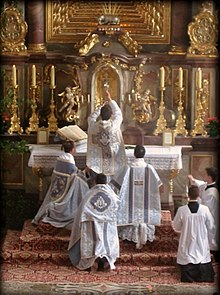
Back Katholischer Traditionalismus ALS كاثوليكية تقليدية Arabic Каталікі-традыцыяналісты Byelorussian Tradicionalisme catòlic Catalan Katolický tradicionalismus Czech Katholischer Traditionalismus German Catolicismo tradicionalista Spanish Katolizismo tradizionalista Basque Catholicisme traditionaliste French Hagyományhű katolikusság Hungarian

| Part of a series on the |
| Catholic Church |
|---|
 |
| Overview |
|
|
| Part of a series on |
| Christianity |
|---|
 |
Traditionalist Catholicism is a movement that emphasizes beliefs, practices, customs, traditions, liturgical forms, devotions and presentations of teaching associated with the Catholic Church before the Second Vatican Council (1962–1965).[1][2] Traditionalist Catholics particularly emphasize the Tridentine Mass, the Roman Rite liturgy largely replaced in general use by the post-Second Vatican Council Mass of Paul VI.
Many Traditionalist Catholics disliked the liturgical changes that followed the Second Vatican Council, and prefer to continue to practice pre-Second Vatican Council traditions and forms. Some also see present teachings on ecumenism as blurring the distinction between Catholics and other Christians. Traditional Catholicism is often more conservative in its philosophy and worldview, promoting a modest style of dressing and teaching a complementarian view of gender roles.[3]
A minority of Traditionalist Catholics reject the current papacy of the Catholic Church and follow positions of sedevacantism, sedeprivationism, or conclavism. As these groups are no longer in full communion with the pope and the Holy See, they are not regarded by Holy See to be members of the Catholic Church, but instead separate religious groupings.[4][2] A distinction is often made between these groups (sometimes called Radical Traditionalists) and Catholics who accept the teachings and authority of the Catholic Church while still preferring older traditions and practices as well as the Tridentine Mass in Latin.[2]
- ^ Collinge, William J. (2012). "Traditionalism". Historical Dictionary of Catholicism. Historical Dictionaries of Religions, Philosophies, and Movements Series (2nd ed.). Lanham, Maryland: Rowman & Littlefield. pp. 433–434. ISBN 978-0-8108-7979-9. LCCN 2011035077.
- ^ a b c Cite error: The named reference
rtciwas invoked but never defined (see the help page). - ^ Ochstein, Jennifer (7 September 2017). "A progressive, feminist evangelical considers joining the Catholic Church". America Magazine. Retrieved 26 April 2021.
- ^ "Library : Schismatic Traditionalists". www.catholicculture.org. Retrieved 2023-07-12.